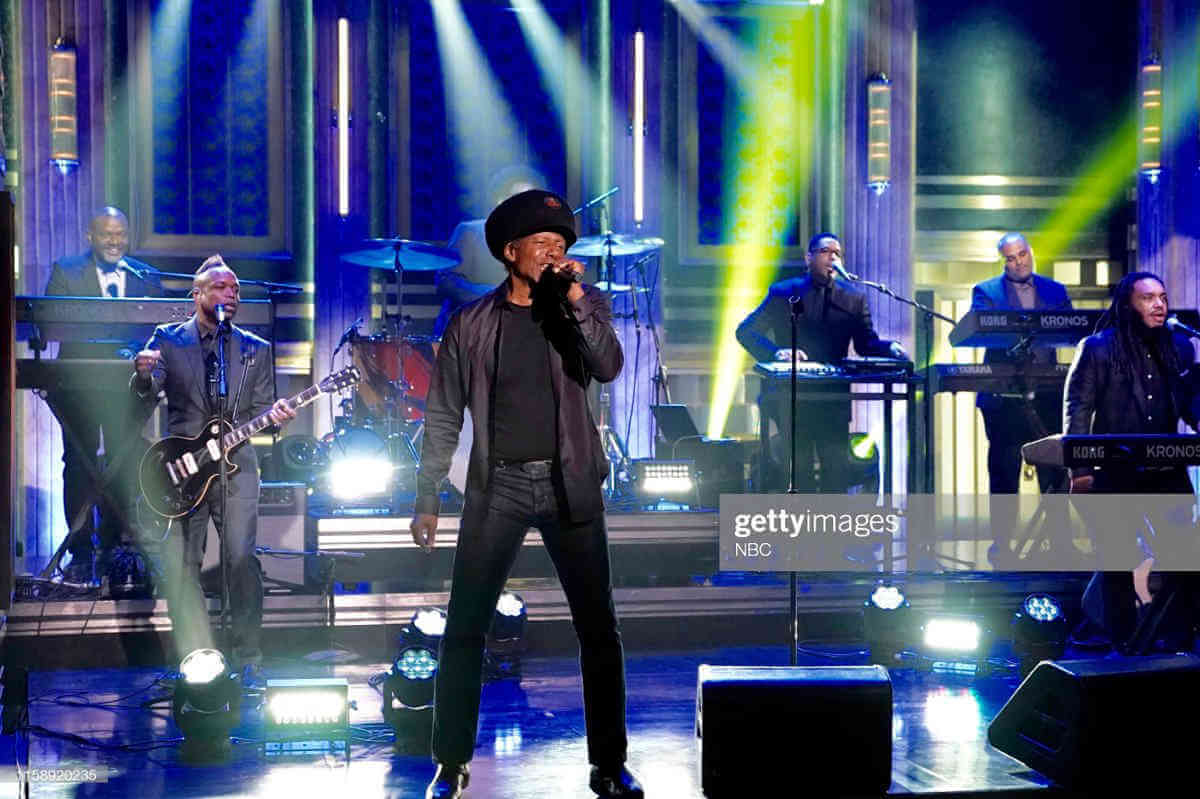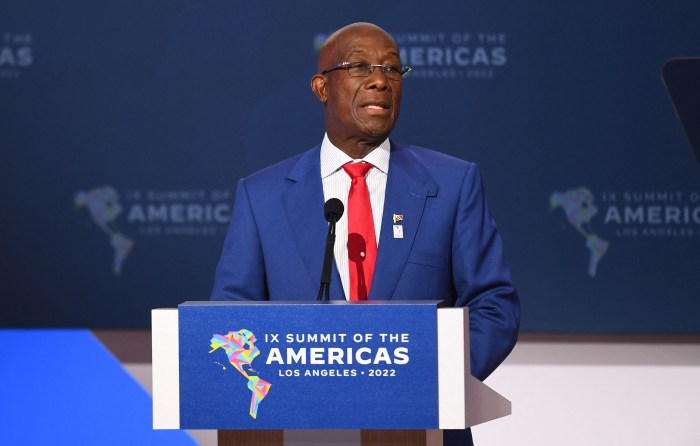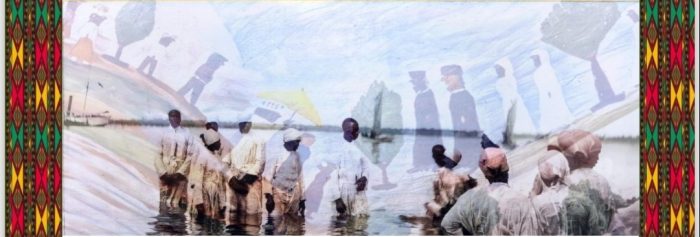A federal judge in the Southern District Court of New York has ruled in favor of famous Guyanese singer Eddy Grant in a lawsuit against former US President Donald J. Trump for copyright infringement.
After four years of litigation between Grant and Trump, Judge John G. Koeltl ruled on Friday that Trump was liable for infringing Grant’s rights by using Grant’s “Electric Avenue“ in an ad in his 2020 presidential campaign.
Trump argued that “Electric Avenue“ was “fair use.“
Grant’s Greenheart Music Limited, a United Kingdom Company (“Greenheart UK”); and Greenheart Music Limited, an Antigua and Barbuda Limited Company (“Greenheart Antigua“), brought the copyright infringement action against Trump and Donald J. Trump For President, Inc. (“the Campaign”) (collectively, “the defendants”) for the unauthorized use of Grant’s music in an animated video created by a third party during the 2020 presidential election campaign and posted by former President Trump on his personal Twitter account (“the Video”).
The plaintiffs asserted claims for copyright infringement of the musical composition of “Electric Avenue“ (Count I) and copyright infringement of the sound recording of “Electric Avenue“ (Count II). The Court denied the defendants’ motion to dismiss in an Opinion and Order dated Sept. 28, 2021.
The parties then filed cross-motions for partial summary judgment.
The defendants then moved for summary judgment, dismissing Count II of the complaint because the plaintiffs lacked a valid copyright registration for the sound recording of “Electric Avenue.”
The plaintiffs moved for summary judgment on the issue of liability.
The Court heard oral argument on the motion on Sept. 6, 2024.
On Friday, Judge John G. Koeltl denied the defendants’ motion for partial summary judgment and granted the plaintiffs’ motion for partial summary judgment.
The judge noted that Plaintiff Grant was the sole owner of Greenheart Antigua and Greenheart UK, the licensing arm of Greenheart Antigua, and that “Grant wrote, recorded, and produced the 3-minute-48-second song entitled ‘Electric Avenue.‘”
In or about 1983, Koeltl said Grant assigned all of his rights and interests in the musical composition (the “Composition”) and sound recording (the “Recording”) of “Electric Avenue“ to Greenheart Antigua.
In February 1983, the composition was registered in the United States Copyright Office under Registration Number PA0000164029. Id. ¶ 5. The song was also released to the public in the United States in or about 1983. Pls.‘ Resp. ¶ 4.
Pursuant to an agreement dated May 3, 2001, Greenheart UK licensed the copyright in the recording, among other works, to Warner Music UK Limited (“Warner Music”) for a territory including the United States for five years from the date of the first release of the recording in the United Kingdom.
The sound recording of “Electric Avenue” was included in a compilation entitled “Eddy Grant: The Greatest Hits,” which was covered by the agreement.
The agreement provided, among other things, that Warner Music was “exclusively entitled to exploit and publicly perform the Recordings in the form of the Compilation . . . for the Rights Period throughout the Territory.”
The judge noted that during the term of the Agreement, on March 22, 2002, London Records, an affiliate of Warner Music, registered the album “Eddy Grant: The Greatest Hits“ containing the recording in the Copyright Office.
On Aug. 12, 2020, he said that Daniel Scavino, director of Social Media and Deputy Chief of Staff for Communications of the Executive Office of the President, published a tweet to former President Trump’s Twitter account containing a 55-second video in which the recording, embodying the composition, can be heard starting at the 15-second mark and continuing for the duration of the video.
Scavino testified that he saw the video on a Trump supporter’s social media page either the same day or the day before he posted the tweet.
He also testified that he spoke with former President Trump before posting the Tweet and that former President Trump “let [him] go with [his] instinct on it and post it.”
Trump testified that the video was taken from the internet and posted on Twitter.
The plaintiffs alleged that the Video was a campaign video attempting to denigrate the Democratic Party’s 2020 nominee, current President Joseph Biden.
The video contains an animation of a high-speed red train bearing the words “Trump Pence [Keep America Great] 2020,“ in stark contrast to a slow-moving handcar bearing the phrase “Biden President: Your Hair Smells Terrific.”
Judge Koeltl said the handcar is powered by an animated likeness of President Biden, and excerpts of President Biden’s speeches and interviews are played over the recording.
At the time, the judge said Trump’s Twitter account had nearly 100 million followers.
He said that, according to Twitter, the video has been viewed more than 13.7 million times, the Tweet containing the video has been “liked“ more than 350,000 times, retweeted more than 139,000 times, and received close to 50,000 comments.
In a letter dated Aug. 13, 2020, the judge said the plaintiffs, through their counsel, demanded that the defendants “cease and desist from any further allegedly infringing conduct.“
As of Sept. 1, 2020, he said neither the video nor the Tweet containing the video had been removed from Twitter. On Sept. 1, 2020, the plaintiffs filed the lawsuit action.
In moving for partial summary judgment, the plaintiffs said the defendants were liable for copyright infringement.
They argued that the only defense to liability is fair use, that there were no issues of material fact, and that the fair use defense did not apply in this case.
“There is no dispute that the composition and the sound recording of the musical performance for ‘Electric Avenue‘ were used without permission and that the composition was copyrighted,“ ruled Judge Koeltl, stating that the plaintiffs also hold a valid copyright registration covering the sound recording of “Electric Avenue.”
“The only defense that the defendants raise is that the video’s use of ‘Electric Avenue‘ was a fair use,“ he added. “Therefore, the only bar to a finding of liability by the defendants for copyright infringement as alleged in Counts I and II of the Complaint is the defense of fair use.”
Accordingly, the judge said the defendants’ argument that “Electric Avenue“ must have been unpublished at the time of the registration of “Eddy Grant: The Greatest Hits“ is not persuasive.
“In short, the Agreement gave London Records the right to register the copyright on the compilation that included the sound recording of ‘Electric Avenue,’“ he said. London Records filed that registration and nothing in the registration or the law precluded the application of that registration to the sound recording of “Electric Avenue.”
“Therefore, the defendants’ motion for summary judgment dismissing the claim for copyright infringement of the recording of ‘Electric Avenue’ (Count II) is denied,“ Judge Koeltl ruled.



























